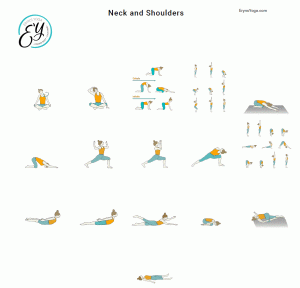
Many of my students complain about having a tight neck and shoulders. Because we live in a “forward-rounded society,” it’s no wonder! We get up in the morning, check our phones, drive to work, sit at a desk, drive home from work, sit on the couch, go to bed, repeat, repeat, repeat. Certainly, this isn’t every person’s typical day, but too often, it is.
Hours spent at slumped at a desk, watching TV, tapping away on smartphones, and driving can wreak havoc on our posture, with all of the cascading physical consequences that come with it. Hunched over our devices for hours on end creates chronically tight and contracted pectoral muscles and chronically weakened, “locked long,” neck, mid-back, and rear deltoid (shoulder) muscles. But there are more negative health consequences that go along with a less-than-optimal posture.
Prevent Hunchback at Any Age
Kyphosis is the technical term for what you might recognize as a “hunchback position” and derives from the Greek word, meaning “a hump.” It refers to an excessively forward rounded mid- to upper back. Most people think this is a natural process of getting older — this is absolutely not true! While in some cases the malformation is due to osteoporosis, in many other cases, it is a postural habit that can be prevented and even reversed, or at the very least, improved.
7 Surprising Reasons Poor Posture is Bad for Your Health:
- Poor posture inhibits deep breathing. Deep breathing calms the mind and brings feelings of health and well-being.
- Deep breathing increases energy; shallow breathing literally drain a person.
- The inability to “sit tall” profoundly affects one’s mood and perspective. Try for yourself and see: Right now, shift your posture to sit tall, chest lifting, shoulders down. Do you notice the immediate impact on your mood?
- Feelings of self-worth and self-confidence can be compromised by a posture that means always looking down at the floor.
- Shallow breathing creates more tension in the neck and shoulders, contributing to the problem.
- Muscle imbalances can lead to chronic pain and discomfort, in addition to compromised strength and balance.
- Compressed internal organs inhibits optimal circulation and digestion.
The beginning postures of this sequence will offer some relief from any built-up stress or tension in the region, but more importantly, the spinal extensions will help to strengthen the upper back and shoulders to maintain the lengthening work that you’ve done.
Close with some gentle spinal twists to stretch the intercostal muscles between the ribs (their elasticity contributes to deeper breathing capacity) and, as always, a final relaxation to integrate and absorb the multidimensional benefits of your practice.
Eryn Kirkwood is a local writer and yoga teacher who specializes in classes for students aged 55 years and older. Her charisma and passion for precise anatomical details make her a popular local teacher! She offers a full schedule of classes at Barrhaven United Church in Barrhaven, Nepean, along with workshops and other offerings! See ErynsYoga.com for more information.






